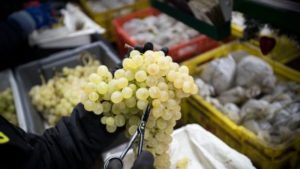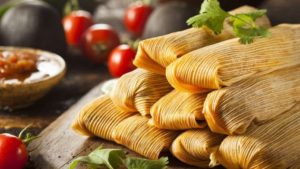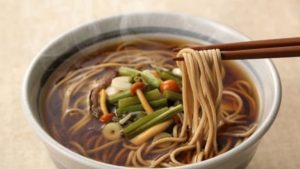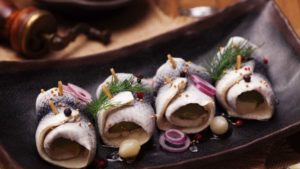By: Angela Moreno
Depending on your idea of a New Year’s Eve celebration, it could be ringing in the New Year with a bottle of champagne at midnight, or, ideally the celebration could just be in getting the kids to bed early. In any case, New Year’s Eve traditions around the world are very different. In some parts of the world, the traditions are in the food.
The traditions and meanings may vary, but the theme is the same: Share food with family and friends to welcome a prosperous New Year.
Here are just a few New Year’s food traditions that are celebrated around the world:
12 Grapes: Spain

The people of Spain observe a very different annual New Year’s Eve tradition. At the stroke of midnight, they eat one grape for every clock bell toll.
Some take it one step further and prepare their grapes ahead of time by peeling and removing the seeds. Subsequently, this tradition has passed to other Spanish-speaking cultures as well.
Tamales: Mexico
 Tamales—or dough made of corn and stuffed with meat, cheese and other delectable additions and wrapped in a corn husk—make appearances at pretty much every special occasion in Mexico. But, the holiday season is an especially favored time for this favored food. In many families, the women gather to make hundreds to hand out to friends and family. Additionally, menudo is traditionally served on New Year’s Day. A Mexican delicacy, menudo is a soup made of tripe (cow stomach) and hominy.
Tamales—or dough made of corn and stuffed with meat, cheese and other delectable additions and wrapped in a corn husk—make appearances at pretty much every special occasion in Mexico. But, the holiday season is an especially favored time for this favored food. In many families, the women gather to make hundreds to hand out to friends and family. Additionally, menudo is traditionally served on New Year’s Day. A Mexican delicacy, menudo is a soup made of tripe (cow stomach) and hominy.
Those who live in cities with large Mexican populations can find tamales sold to-go at restaurants for New Year’s Eve and Day. But foodies who want the real deal should head to Mexico City, where steamed tamales are sold from vendors on street corners as well as in restaurant establishments.
Marzipanschwein (Glücksschwein): Austria and Germany
 Austria and Germany call New Year’s Eve Sylvesterabend, or the eve of Saint Sylvester. Austrians drink a punch of red wine, cinnamon and spices. They also celebrate the pig by having it for dinner and decorating the table with little pigs made of marzipan, or marzipanschwein. Good luck pigs—Glücksschwein—which can be anything from pig-shaped sweets to baked goods, are also commonly given as gifts throughout Austria and Germany.
Austria and Germany call New Year’s Eve Sylvesterabend, or the eve of Saint Sylvester. Austrians drink a punch of red wine, cinnamon and spices. They also celebrate the pig by having it for dinner and decorating the table with little pigs made of marzipan, or marzipanschwein. Good luck pigs—Glücksschwein—which can be anything from pig-shaped sweets to baked goods, are also commonly given as gifts throughout Austria and Germany.
Soba noodles: Japan
 Long noodles made of buckwheat are eaten at midnight on New Year’s Eve in Japanese households to bid adieu to the year that is ending and to welcome in the New Year. Long noodles are a symbol of longevity and prosperity.
Long noodles made of buckwheat are eaten at midnight on New Year’s Eve in Japanese households to bid adieu to the year that is ending and to welcome in the New Year. Long noodles are a symbol of longevity and prosperity.
Another Japanese custom, mochitsuki, involves making mochi rice cakes. Family and friends spend New Year’s Eve day making these sweet cakes of glutinous rice. Guests take turns pinching off pieces to make into buns which they enjoy later for dessert.
King Cake: All around the world
 Many cultures, including Greece, France, Mexico, and Bulgaria observe a tradition of consuming a cake on New Year’s. These cakes are typically eaten at midnight on New Year’s Eve, though some cultures enjoy on Christmas or during the Epiphany, January 6th.
Many cultures, including Greece, France, Mexico, and Bulgaria observe a tradition of consuming a cake on New Year’s. These cakes are typically eaten at midnight on New Year’s Eve, though some cultures enjoy on Christmas or during the Epiphany, January 6th.
Additionally, some cultures hide a gold coin or figure as a symbol of prosperity in the coming year for whomever finds it.
Pickled herring: Poland and Scandinavia
 In Poland and parts of Scandinavia, herring is bountiful. Pickled herring is eaten at midnight to usher in a prosperous year. Pickled herring can be enjoyed in cream sauce, with onions, or soaked in water and then layered in a jar with onions, white vinegar, sugar, and allspice.
In Poland and parts of Scandinavia, herring is bountiful. Pickled herring is eaten at midnight to usher in a prosperous year. Pickled herring can be enjoyed in cream sauce, with onions, or soaked in water and then layered in a jar with onions, white vinegar, sugar, and allspice.
As we usher in a New Year and a new decade, consider all the different ways to celebrate this day!

Happy New Year from Advantage Nutrition & Wellness! Wishing everyone a very happy, blessed, and prosperous 2020!
*Adapted from CNN article on NYE food traditions.



